
No. 11, 2025 | 8 August 2025
Go to:
From FRSA's Executive Director
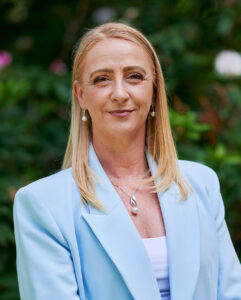
Following extended periods of uncertainty about the future of funding for services across the Family and Relationships Services sector, we received advice yesterday afternoon from the Attorney-General’s Department that the decision had been made by the Attorney-General to extend services within the FRSP program for two further years – through until 30 June 2028. Whilst it had been previously flagged by the Department that this would be likely given the time required to work through the recommendations of the Metcalfe Report and any associated transitional arrangements, it is good to have that advice confirmed. At this stage there has been no commitment from Government to extend the 4-year supplementation payment for community sector organisations announced in the October 2022 Budget. This will mean a reduction in funding for FRSP grants over the two-year extension period.
If you have been reading a newspaper/listening to the news of late – the Albanese Government is squarely focused on improving productivity, including in the social services sector. FRSA was pleased to participate in a roundtable at Parliament House on Tuesday – ‘Working Smarter: A Roundtable on the Role of the Not-For-Profit Sector in Boosting Productivity.’ The Roundtable was led by Ministers’ Andrew Leigh, Tanya Plibersek and Assistant Minister Ged Kearney and brought together social services and philanthropic representatives from across the Country to nut out practical ideas to boost productivity. In fairness to the Government – the messages they are sending are not about expecting our people who are working at 110% to move to 120% (more for less). It is about ‘working smarter’ – about remedying system barriers (eg: reducing red tape) and seeking technological solutions that decrease the administrative workload. It is intended to free up time for social service staff so they can focus more on the educative, therapeutic and support elements of their work. That said – innovation does cost money to implement so we also need to be realistic about that too. Ideas will be taken forward to the Government’s Economic Reform Roundtable later this month. We’ll also build on some of these ideas with FRSA Members at our annual Strategic Leadership Forum later this year. I am delighted to let Members know that registration for the Strategic Leadership Forum is now open (see more below).
On 4 August – National Aboriginal and Torres Strait Islander Children’s Day – the Albanese Government announced the appointment of the inaugural Aboriginal and Torres Strait Islander Children’s Commissioner, Adjunct Professor Sue-Anne Hunter (see more below). I extend my congratulations and look forward to connecting with Commissioner Hunter in the coming months. Thanks too to the former Acting Commissioner Lil Gordon for her work to date. We were very fortunate to have Lil speak at our Conference. If you weren’t there and would like to revisit what she had to say – her speech is available here.

For the first part of this week I have been out in western NSW – accepting an invitation from CatholicCare Wilcannia-Forbes to come and spend some time visiting their services and meeting with frontline staff. The insights and experiences shared certainly highlighted the challenges faced by services operating in rural and remote areas of this country as well as the innovation, commitment and dedication needed to achieve outcomes and assist in building better lives for the children, women, men and communities they work with. It was heartbreaking to hear that in the towns I had visited there was literally nowhere to place people in crisis accommodation – especially those escaping family violence. Affordable housing was non-existent. The agency was providing tents and swags to people coming in seeking shelter and I know the experience of CCWF is regrettably relatable in many parts of this country. Homelessness Week, this week, provides a valuable platform to keep the issue at the forefront of the political agenda and advocate for the needs of those needing safe, secure, suitable and sustainable housing across Australia.
Kind regards,
Jackie Brady
FRSA Executive Director


Strategic Leadership Forum 2025
Registrations for the FRSA Strategic Leadership Forum 2025 are NOW OPEN!
The dates are set for 29-30 October 2025 in Canberra.
We are working to build a program that provides CEOs and Senior Managers with the most relevant and most contemporary news and information of importance to the Family and Relationship Services sector.
To assist you in making your arrangements to attend whilst we finalise the program:
Day 1: Wednesday, 29 October 2025
Location: National Portrait Gallery, Parkes Way, Canberra
Start time: 10am
End time: 5pm
Networking event – 5pm-6pm (venue – TBA)
Day 2: Thursday, 30 October 2025
Breakfast event – Parliament House – 7:30am – 8:30am
Parliamentary Briefing Day – small group visits with Parliamentarians
Location: Australian Parliament House
Start time: 9am
End time: 2pm (Dependent on when your final meeting is scheduled)
Access to the event details including the event program, speaker information and accommodation will be available on the FRSA Members Only Event page.
Please contact events@frsa.org.au for the password to the FRSA Member’s Only Event page.
FRSA Member-only Family Law Communities of Practice
FRSA will be delivering Family Law Communities of Practice (CoP) discussions exclusively for FRSA Members in 2025-26 and we are looking for participants!
FRSA invites program managers and senior practitioners from providers of the seven programs below, which are funded under the Attorney-General’s Department, to express their interest in joining the online Community of Practice (CoP) discussions:
- Family Relationship Centres (FRC)
- Family Dispute Resolution (FDR)
- Regional Family Dispute Resolution (RFDR)
- Family Law Counselling
- Supporting Children After Separation Program (SCASP)
- Parenting Orders Program (POP)
- Children’s Contact Services (CCS)
Three CoP discussions for each program areas will be held in the remainder of the 2025-26 year and will focus on program-wide or systems practice issues rather than therapeutic or support issues arising in the practitioner-client relationship.
For more information about how the Member-only Family Law CoPs work and what they will look like in 2025-26, read the information sheet.
To express your interest in participating in a Family Law CoP, please register via the link below.
If you are unsure if your organisation is a member of FRSA or you have any questions about the Family Law CoPs please contact Robyn Clough, Manager Policy & Research on 02 6162 1811 or FLProjects@frsa.org.au
Expressions of interest close COB Friday 29 August 2025.
A First Nations focus on family and relationship services webinar series
 FRSA is excited to revisit First Nations focused presentations from the FRSA National Conference 2025 via this lunchtime webinar series, which will be held from September to December.
FRSA is excited to revisit First Nations focused presentations from the FRSA National Conference 2025 via this lunchtime webinar series, which will be held from September to December.
The presentations we’re showcasing in this webinar series are delivered by or in partnership with First Nations peoples. The webinar series, ‘A First Nations focus on family and relationship services’, is open to members and non-members and will feature presentations that were from the Family Domestic Violence, Across the Lifecourse and Schooling years streams.
The first webinar, Supporting Aboriginal Ways of Knowing Being and Doing: Asset- and Place-Focused Service Development and Delivery will be held on Tuesday, 9 September 2025 and will be presented by Dr Jen Cleary & Jaylene Ware from Centacare Catholic Country SA.
This webinar will showcase Centacare’s shift from centrally-managed programs to community-led, place-based models that empower local communities—particularly Aboriginal communities—by recognising and building on their strengths. Through real-world examples, the presentation will highlight how locally embedded Community Development Officers are fostering trust, strengthening connections, and leading meaningful change beyond traditional program constraints.
Click the link below to register and stay tuned for more details on the other webinars coming soon.

ABS release – Marriages and Divorces
The Australian Bureau of Statistics (ABS) has released its latest data on Marriages and Divorces in Australia. The reference period is 2024.
The data shows that:
- 120,844 marriages were registered in 2024, 2.0% more than in 2023.
- The most popular date to marry was 24/02/2024, with 1,773 marriages on that day.
- The number of divorces granted in 2024 fell 3.0% to 47,216.
The crude marriage rate in 2024 (the number of marriages divided by the population aged 16 and over) was unchanged from 2023 at 5.5 marriages per 1,000 people. This is comparable to the pre-pandemic rate in 2019 of 5.6 marriages per 1,000 people.
The crude divorce rate was 2.1 divorces per 1,000 people, down from 2.3 in 2023. The median duration of marriages (from marriage to divorce) increased to 13.2 years (from 13.0 years in 2023).
The data release and methodology are available on the ABS website.
New analysis – Australians' poker machine losses
New analysis by The Australia Institute reveals that the vast majority of the money Australians lose on poker machines each year is money they simply cannot afford to lose.
According to the Australian Institute of Health and Welfare, one-third of Australian adults use poker machines at least once a year. Excluding Western Australia, where pokies are banned outside of Perth Casino, that equates to 6.6 million people who, between them, lose around $13 billion a year, at an average of more than $1,950 each.
Based on an updated version of the most detailed study of gambling in Australia, the amount an average gambler can afford to lose on poker machines is $301 per year, known as their “low-risk gambling limit”. For every dollar a gambler loses over that low-risk limit, the risk increases.
Skye Predavec, Anne Kantor Fellow at The Australia Institute and author of the analysis, concluded that “Poker machines are making a killing from problem gamblers.”
Financial risk indicators of child sexual abuse live streaming
The live streaming of child sexual abuse (CSA) is a technologically and financially enabled crime type which has proliferated in recent years. A recent study by the Australian Institute of Criminology used a machine learning approach to produce a proof-of-concept model for identifying the financial indicators associated with CSA live streaming.
Seven financial risk indicators were identified. Six risk indicators centred on the value of transactions, and one on the age of the individual making the transactions. The model was successful at identifying those who live streamed child sexual abuse, while making few errors in identifying those who did not.
The findings reveal an important opportunity to use financial transactions as an avenue for detecting and disrupting CSA live streaming. This proof-of-concept model offers support for an approach to targeting individuals who have previously operated with a significant degree of impunity, ultimately reducing some of the harm caused to children through live streamed CSA.
You can read about the study here.
SNAICC early years support evaluation final report
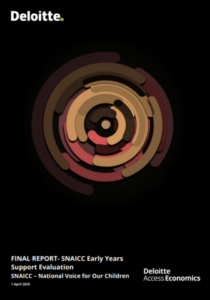 SNAICC has released the final report on the SNAICC early years support evaluation.
SNAICC has released the final report on the SNAICC early years support evaluation.
The report presents the findings of an independent evaluation by Deloitte Access Economics of SNAICC Early Years Support (previously known as THRYVE), conducted over its 2022–2024 pilot phase. The program supports and represents Aboriginal and Torres Strait Islander early years services, aiming to enable culturally strong, high-quality, and accessible support for children, families, and communities.
The evaluation highlights the program’s development, emerging impact and the conditions that support its success and future potential. The purpose of the evaluation has been both developmental (to support formative insights to improve and strengthen the program in its establishment) and summative (seeking to isolate and articulate the impact and effectiveness of the program).
The evaluation has employed a mixed-method approach drawing on a wide range of evidence sources. Most central to the evaluation evidence is service voice, collected through annual surveys, consultations and observations. Annual consultations were also held with a range of government and sector stakeholders, as well as SNAICC Early Years Support teams. The evaluation has also drawn on secondary data, including service level reporting, where available.
Aboriginal and Torres Strait Islander Children’s Commissioner appointed
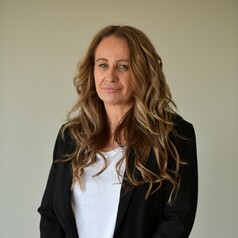 On Monday 4 August – National Aboriginal and Torres Strait Islander Children’s Day – the Albanese Government announced the appointment of Australia’s first National Commissioner for Aboriginal and Torres Strait Islander Children and Young People.
On Monday 4 August – National Aboriginal and Torres Strait Islander Children’s Day – the Albanese Government announced the appointment of Australia’s first National Commissioner for Aboriginal and Torres Strait Islander Children and Young People.
Adjunct Professor Sue-Anne Hunter will take on this role, commencing later this year. A proud Wurundjeri and Ngurai Illum Wurrung woman, Ms Hunter brings over 20 years of experience in the family services sector, including senior roles at SNAICC – National Voice of Our Children, the Victorian Aboriginal Child Care Agency (VACCA) and as a frontline social worker. She was a Commissioner and Deputy Chair of the Yoorook Justice Commission.
As the National Commissioner for Aboriginal and Torres Strait Islander Children and Young People, Ms Hunter will drive change to dismantle barriers faced by First Nations children and young people.
She will replace Lil Gordon who has performed the role of Acting Commissioner since January this year. We were privileged to have the Acting Commissioner deliver a keynote address at the FRSA National Conference earlier this year.
FRSA congratulates Ms Hunter on her appointment, and we congratulate the Albanese Government for establishing this important role.

Early Childhood Education and Care legislation introduced to Parliament
Legislation introduced by the Albanese Government on 23 July to improve child safety in early education and care services has been passed in Parliament.
The Early Childhood Education and Care (Strengthening Regulation of Early Education) Bill 2025 will give the Commonwealth Government power to cut off funding to child care centres that don’t meet the National Quality Standard when it comes to safety and quality, where there’s a breach of the law, or where centres are acting in a way that puts the safety of children at risk.
The legislation will also allow Commonwealth officers to perform spot-checks without warning to detect fraud and non-compliance across the sector.
The Bill, Explanatory Memorandum and Bills Digest are available on the Australian Parliament website.
Closing the Gap – Annual data compilation report 2025
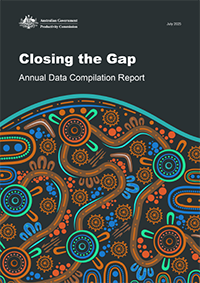 The Productivity Commission has released the latest Annual Data Compilation Report (ADCR), which tracks Australia’s performance towards the targets and indicators in the National Agreement on Closing the Gap.
The Productivity Commission has released the latest Annual Data Compilation Report (ADCR), which tracks Australia’s performance towards the targets and indicators in the National Agreement on Closing the Gap.
The report shows mixed progress, with four of 19 targets on track to be met.
Outcomes are continuing to worsen in four targets: adult imprisonment (Target 10), children in out-of-home care (Target 12), suicide (Target 14), and children developmentally on track (Target 4).
Outcomes are improving but targets are not on track to be met in six targets: life expectancy (Target 1), healthy birthweights (Target 2), year 12 or equivalent qualifications (Target 5), tertiary qualifications (Target 6), youth engagement (Target 7), and appropriately sized housing (Target 9A).
Outcomes are improving and targets are on track to be met in four targets: preschool program enrolments (Target 3), employment (Target 8), and land mass and sea country subject to legal rights and interests (Targets 15A and 15B).
Outcomes for one target are assessed as having no change from the baseline year: youth justice (Target 11).
The Productivity Commission is still unable to assess progress against four targets: access to essential services (Target 9B), family violence (Target 13), number and strength of Aboriginal and Torres Strait Islander languages being spoken (Target 16), and digital inclusion (Target 17).
The report and data downloads are available on the Productivity Commission website.
Economic Reform Roundtable
 The Treasurer, the Hon Jim Chalmers MP has released the agenda for the Economic Reform Roundtable, which will be held on 19-21 August 2025. The Roundtable aims to build consensus on ways to improve productivity, enhance economic resilience and strengthen budget sustainability. It will bring together a mix of leaders from business, unions, civil society, government and other experts.
The Treasurer, the Hon Jim Chalmers MP has released the agenda for the Economic Reform Roundtable, which will be held on 19-21 August 2025. The Roundtable aims to build consensus on ways to improve productivity, enhance economic resilience and strengthen budget sustainability. It will bring together a mix of leaders from business, unions, civil society, government and other experts.
The agenda includes:
- Resilience:
- international risks, opportunities and trade
- Skills attraction, development and mobility
- Capital attraction and business investment
- Productivity
- Better regulation and approvals
- Competition and dynamism across the federation
- AI and innovation
- Budget sustainability and tax reform
- Efficient and high-quality government services, spending and care
- A better tax system.
In the lead up to the Roundtable, the Treasury held a public consultation on economic reform. FRSA’s submission to this consultation is available on our website. FRSA also participated in a Roundtable on the Role of the Not-for-Profit Sector in Boosting Productivity on 5 August. This Roundtable was led by Minister Plibersek and Minister Leigh and the outcomes will feed into the Economic Reform Roundtable later this month.

CatholicCare Sydney appoints Deputy CEO
 CatholicCare Sydney announced the appointment of Kate Dover as Deputy CEO.
CatholicCare Sydney announced the appointment of Kate Dover as Deputy CEO.
CatholicCare Sydney Chair, John Leotta said, “Kate’s appointment reflects the strength of her leadership and achievements in her 13 years with CatholicCare, and over 25 years in the NGO sector”.
Following Bay Warburton’s departure as Interim CEO, Kate will also take on the role of Acting CEO. Kate was previously the Executive Director for Children & Family Services.
FRSA congratulates Kate on her new position and wishes Bay all the best for the future.
2025 Tropical North Queensland Queensland Training Awards
 Centacare FNQ was named a finalist in the recent 2025 Tropical North Queensland Queensland Training Awards. The regional final was held on 25 July 2025 at the Trinity Room, Cairns Convention Centre.
Centacare FNQ was named a finalist in the recent 2025 Tropical North Queensland Queensland Training Awards. The regional final was held on 25 July 2025 at the Trinity Room, Cairns Convention Centre.The annual awards recognise individuals and organisations that strive for and have achieved success, best practice and innovation in vocational education and training (VET). Well done to their finalists:
- Alan Maka – Vocational Student of the Year & Aboriginal and Torres Strait Islander Student of the Year | Certificate IV in Mental Health
- Iryna Kushnir – Equity Student of the Year | Certificate I in Workplace Skills
- School Savvy FNQ – Community Training Initiative of the Year
Tenancy Support Impact Summary
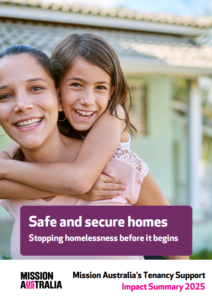 New research from Mission Australia shows tenancy support effectively prevents homelessness by helping people to stay living in their homes.
New research from Mission Australia shows tenancy support effectively prevents homelessness by helping people to stay living in their homes.
The report, Tenancy Support Impact Summary – Safe and secure homes: Stopping homelessness before it begins examined the impact of five years of the organisation’s tenancy support services. The study found that by providing tailored support at the point in time it was needed, almost all (98%) of the people who accessed these services remained living in their homes and avoided homelessness. The snapshot shows early, targeted tenancy support not only prevents homelessness but improves people’s wellbeing and builds their capacity and stability while giving them hope for the future.
Demand for Mission Australia’s tenancy support services has surged to an all-time high, with a 52% increase in people seeking assistance between 2023 and 2024. The fastest growing groups of people seeking support over the last 12 months are employed people, young people, or those escaping family and domestic violence.
Kids Helpline Official Impact Report
 Yourtown has released their Kids Helpline Official Impact Report 2024. During 2024, they responded to over 130,000 contacts – an increase from 122,356 the previous year.
Yourtown has released their Kids Helpline Official Impact Report 2024. During 2024, they responded to over 130,000 contacts – an increase from 122,356 the previous year.
Contacts relating to mental health, emotional wellbeing and suicide make up the top three issues as a proportion of total contacts. Young people living in New South Wales are the highest users of Kids Helpline, with more than 40,000 contacts from children and young people to counsellors in 2024. In Queensland, there were just over 27,000 contacts.
Top 5 reasons young people reached out:
1. Emotional wellbeing
2. Mental health concerns
3. Suicide-related concerns
4. Family relationship issues
5. Friends/peer relationship

Family & domestic violence in military and veteran families survey
Monash University and the Australian Institute of Family Studies are conducting a national research project jointly funded by the Department of Veteran Affairs and Australia’s National Research Organisation into Women’s Safety.
Does your organisation provide services to current and former serving Australian Defence Force (ADF) members and/or their families or services to the general public where family and domestic violence use may be reported?
If so, they invite they to complete a 5-10 min survey, which asks about how data relating to the experience and use of family and domestic violence and the military service status of clients accessing your services is captured. By doing so, you can help us improve the way in which family violence in military and veteran families is reported. Learn more or complete the survey.
Emerging Minds LEARN study
Emerging Minds recently launched a new research project, the Longitudinal Evaluation and Research Network (LEARN) study. The project has been designed to help continue providing effective workforce development resources for Australian professionals by growing their understanding of what helps and hinders the translation of learning into practice.
The LEARN study invites practitioners, leaders and workers across a range of sectors to reflect on their experiences of working with children, parents and/or families. This paid research opportunity begins with a short registration process and an online survey that should take about 15 minutes to complete. Ethics approval for the study has been received from Monash University Human Research Ethics Committee (Project ID: 48131). Find out more.
Effective Online Group Leadership Workshop
SUNSHINE CIRCLES – Albury
SUNSHINE CIRCLES – Shepparton
ACT
Senior Practitioner Post Separation Services | Relationships Australia Canberra and Region
VIC
Regional Family Dispute Resolution Practitioner (RFDRP) | Mallee Family Care
NSW
Counsellor (Child & Family) – Domestic Violence | The Benevolent Society
Couple and Family Counsellor | Relationships Australia NSW
Family Dispute Resolution Practitioner & General Mediator | Interrelate
NT
Family & Relationship Counsellor | Anglicare NT
WA
Practice Lead, Family Dispute Resolution| Centacare Family Services
Family Dispute Resolution Practitioner (FDRP) | Centacare Family Services
If you have any events you’d like listed on the FRSA Events and Training Calendar or job vacancies you’d like listed on the FRSA Jobs Board, email Communications Officer, Vanessa Lam at communications@frsa.org.au. Please note that posting onto the FRSA website is reserved for FRSA Members only.

National report card 2024: monitoring the performance of Australia’s mental health system | National Mental Health Commission
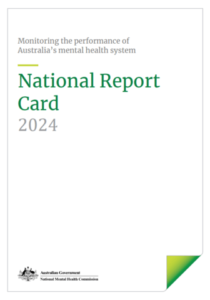 The report examines the performance of the Australian mental health system, the prevalence of mental health challenges and the drivers behind it. It shows a steady rise in financial stress and the number of Australians delaying mental health care due to cost.
The report examines the performance of the Australian mental health system, the prevalence of mental health challenges and the drivers behind it. It shows a steady rise in financial stress and the number of Australians delaying mental health care due to cost.
Older and younger workers: what do employers think? | Australian HR Institute
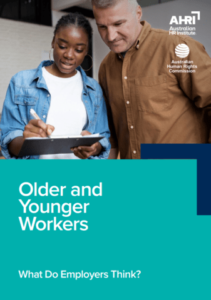 The report provides a snapshot of how older and younger workers are perceived, supported and included in Australian workplaces. Despite the tight Australian labour market, the survey highlights persistent age-based barriers to employment at both ends of the age spectrum. It provides actionable insights on recruitment, lifelong learning and training, health and wellbeing, and inclusivity.
The report provides a snapshot of how older and younger workers are perceived, supported and included in Australian workplaces. Despite the tight Australian labour market, the survey highlights persistent age-based barriers to employment at both ends of the age spectrum. It provides actionable insights on recruitment, lifelong learning and training, health and wellbeing, and inclusivity.
Inquiry into housing policy and disaster: better coordinating actors, responses and data | Australian Housing and Urban Research Institute
 The coordination and integration of housing policy and settlement planning with disaster prevention, preparedness, response and recovery is essential. This final report finds that climate-related disasters in Australia are set to increase. To keep up, policies, practices and priorities must be better coordinated to meet both short- and long-term needs.
The coordination and integration of housing policy and settlement planning with disaster prevention, preparedness, response and recovery is essential. This final report finds that climate-related disasters in Australia are set to increase. To keep up, policies, practices and priorities must be better coordinated to meet both short- and long-term needs.
Salary Survey 2025 | Pro Bono
Pro Bono Australia have released the results of their 2025 Salary Survey. The report provides a detailed view of salary trends in the not-for-profit sector. This year, the report also reveals much about culture, boards and AI.
Vacant housing: data, policies and developments | Parliamentary Research Service (NSW)
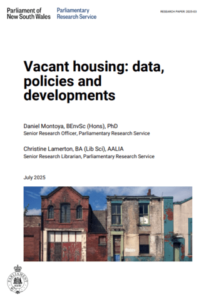 This paper supports more in depth and informed discussion of housing vacancy and how it could be addressed in New South Wales. The policies summarised include monitoring, vacant housing strategies, rental agreements, tax incentives, vacant housing taxes, and compulsory requisition or purchase. Case studies and research findings are included.
This paper supports more in depth and informed discussion of housing vacancy and how it could be addressed in New South Wales. The policies summarised include monitoring, vacant housing strategies, rental agreements, tax incentives, vacant housing taxes, and compulsory requisition or purchase. Case studies and research findings are included.
The transformative power of domestic and sexual violence support agencies | Life Course Centre, University of Queensland
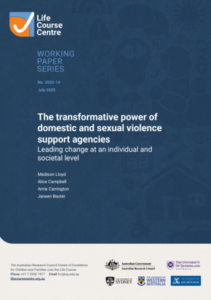 Domestic, family and sexual violence (DFSV) is a pervasive and growing issue in Australia. There is evidence that rates are increasing and incidences are becoming more severe. DFSV support agencies offer a range of services to support victim-survivors. This paper argues that these services also have the potential to lead to social change at a structural level.
Domestic, family and sexual violence (DFSV) is a pervasive and growing issue in Australia. There is evidence that rates are increasing and incidences are becoming more severe. DFSV support agencies offer a range of services to support victim-survivors. This paper argues that these services also have the potential to lead to social change at a structural level.
Feeling supported, not stuck: rethinking intervention orders for children and young people | Victoria Legal Aid
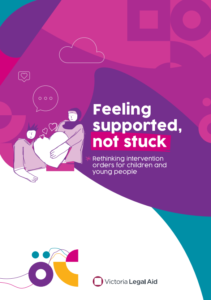 This research examined the experiences of children and young people aged between 10 and 17 who are respondents to Family Violence Intervention Orders and Personal Safety Intervention Orders in Victoria. The report shows that the intervention order system needs a rethink for children and young people. It makes four key findings and outlines what needs to change.
This research examined the experiences of children and young people aged between 10 and 17 who are respondents to Family Violence Intervention Orders and Personal Safety Intervention Orders in Victoria. The report shows that the intervention order system needs a rethink for children and young people. It makes four key findings and outlines what needs to change.
Programs that support the mental health and wellbeing of children with incarcerated parents | Australian Institute of Family Studies and Emerging Minds
Parental incarceration is considered an adverse childhood experience that can have negative and ongoing impacts on children’s mental health and wellbeing. This resource published in collaboration with Emerging Minds provides an overview of the research evidence on various program types for children of incarcerated parents. It also outlines the program types that maybe most effective in supporting children and program elements that may contribute to positive mental health and wellbeing.
Creating respectful learning and work environments | WorkSafe Victoria
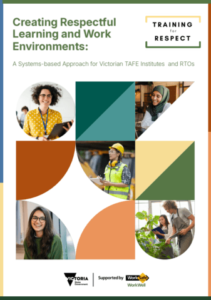 Workplace gendered violence is a serious and persistent issue in the vocational education and training (VET) sector. This Theory of Change sector-wide roadmap focuses specifically on addressing work-related gendered violence, including sexual harassment, in VET environments. It sets out actions to bring about change for the sector, industry networks and peak bodies, VET regulators and government.
Workplace gendered violence is a serious and persistent issue in the vocational education and training (VET) sector. This Theory of Change sector-wide roadmap focuses specifically on addressing work-related gendered violence, including sexual harassment, in VET environments. It sets out actions to bring about change for the sector, industry networks and peak bodies, VET regulators and government.
Understanding and responding to parents of transgender and gender diverse young people | Australian Institute of Family Studies
Many parents of transgender or gender diverse young people are unsure about how to support their child or where to seek advice or information. This short article describes parents’ experiences of navigating the complexities of their children’s gender identity and transition, explains how supporting parents can support their child’s health and wellbeing, and provides practice considerations for working with families of transgender or gender diverse young people.
Building capacity, creating change | AbSec – NSW Child, Family and Community Peak Aboriginal Corporation
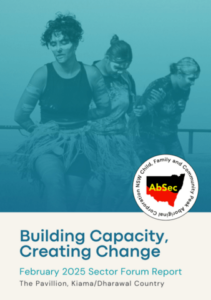 This report provides an overview of AbSec’s February 2025 sector forum which brought together stakeholders to deliberate and shape the future of the Aboriginal and Torres Strait Islander child and family sector in New South Wales. Key outcomes included strengthened collective advocacy, shared priorities for reform and a renewed commitment to self-determination as the foundation for policy and practice.
This report provides an overview of AbSec’s February 2025 sector forum which brought together stakeholders to deliberate and shape the future of the Aboriginal and Torres Strait Islander child and family sector in New South Wales. Key outcomes included strengthened collective advocacy, shared priorities for reform and a renewed commitment to self-determination as the foundation for policy and practice.
Artificial Intelligence, gender and economic equality | Working with Women Alliance
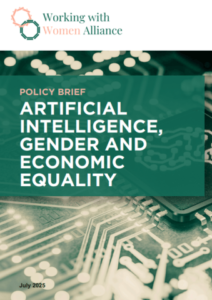 This policy brief examines how the widespread adoption of artificial intelligence (AI) and large language models is amplifying risks to women’s economic equality in Australia. Drawing on recent evidence from employment, financial and housing sectors, this report provides gender-responsive recommendations for regulation and oversight. It offers targeted strategies to ensure that the benefits of AI innovation are shared equitably by women and other marginalised groups.
This policy brief examines how the widespread adoption of artificial intelligence (AI) and large language models is amplifying risks to women’s economic equality in Australia. Drawing on recent evidence from employment, financial and housing sectors, this report provides gender-responsive recommendations for regulation and oversight. It offers targeted strategies to ensure that the benefits of AI innovation are shared equitably by women and other marginalised groups.
Want to submit something to the FRSA eBulletin?
If you have an news item or event that you would like to be featured in a future eBulletin please submit your announcement via the form below or email communications@frsa.org.au with the subject “FRSA eBulletin submission”.
Please note FRSA members receive priority for items posted in the eBulletin. And to keep information current, relevant and useful, submissions will not be repeated from week to week.
Subscribe
Subscribe to receive future eBulletin editions directly to your inbox!







